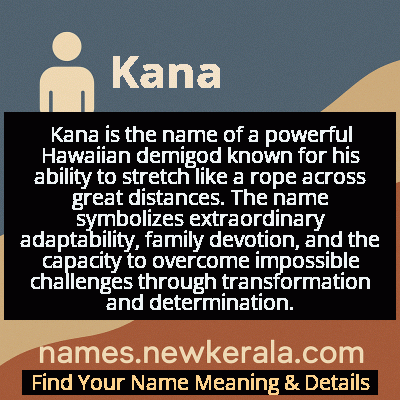Kana Name Meaning & Details
Origin, Popularity, Numerology Analysis & Name Meaning of Kana
Discover the origin, meaning, and cultural significance of the name KANA. Delve into its historical roots and explore the lasting impact it has had on communities and traditions.
Name
Kana
Gender
Male
Origin
Hawaiian
Lucky Number
9
Meaning of the Name - Kana
Kana is the name of a powerful Hawaiian demigod known for his ability to stretch like a rope across great distances. The name symbolizes extraordinary adaptability, family devotion, and the capacity to overcome impossible challenges through transformation and determination.
Kana - Complete Numerology Analysis
Your Numerology Number
Based on Pythagorean Numerology System
Ruling Planet
Mars
Positive Nature
Generous, passionate, energetic, and humanitarian.
Negative Traits
Impulsive, impatient, moody, and can be overly emotional.
Lucky Colours
Red, maroon, scarlet.
Lucky Days
Tuesday.
Lucky Stones
Red coral, garnet.
Harmony Numbers
1, 2, 3, 6.
Best Suited Professions
Military, sports, philanthropy, leadership roles.
What People Like About You
Courage, energy, leadership, generosity.
Famous People Named Kana
Kana (Mythological Figure)
Demigod
Legendary hero who stretched from Molokai to Hawaii to rescue his mother
Kanaʻina
High Chief
Royal Hawaiian chief and father of Queen Liliʻuokalani's husband
Kana Murray
Cultural Practitioner
Modern Hawaiian cultural educator and hula master
Name Variations & International Equivalents
Click on blue names to explore their detailed meanings. Gray names with will be available soon.
Cultural & Historical Significance
The story of Kana represents the Hawaiian concept of 'pono' - the importance of restoring balance and righting wrongs through courageous action. His ability to transform into a rope that could span vast distances also symbolizes connection, bridging gaps between people and places, which resonates with the Hawaiian value of 'ohana (family) extending beyond physical boundaries. In traditional Hawaiian society, Kana's stories were used to teach important cultural values about family responsibility, creative problem-solving, and the idea that true strength comes from using one's abilities to help others.
Extended Personality Analysis
Individuals named Kana are often perceived as possessing remarkable adaptability and resilience, mirroring the demigod's ability to stretch and transform according to circumstances. They typically demonstrate strong protective instincts toward family and loved ones, showing unwavering loyalty and willingness to go to great lengths to help those in need. These individuals tend to be resourceful problem-solvers who can 'stretch' their capabilities when faced with challenges, finding creative solutions where others see obstacles.
Their personality often blends strength with flexibility - they can be firm in their convictions yet adaptable in their approaches. Many bearing this name exhibit a natural leadership quality tempered with humility, understanding that true power comes from serving others rather than dominating them. They often possess an innate sense of justice and a drive to restore balance in situations of conflict or inequality. The mythological Kana's devotion to his mother translates into a personality that values deep, meaningful relationships and demonstrates consistent reliability in both personal and professional contexts.
Modern Usage & Popularity
In contemporary times, Kana remains a meaningful choice for Hawaiian families seeking to honor their cultural heritage while embracing modern identity. The name has maintained steady but selective usage, primarily within Hawaiian and Pacific Islander communities, where it serves as a connection to ancestral stories and values. While not among the most popular Hawaiian names nationally, it carries significant cultural weight and is often chosen by parents who value mythological significance and want to instill qualities of strength, adaptability, and family devotion in their children. The name has seen a slight resurgence in recent years as part of the broader movement to revitalize Hawaiian language and cultural practices, though it remains relatively uncommon outside of Hawaii, preserving its cultural authenticity and distinctive character.
Symbolic & Spiritual Meanings
Kana symbolizes the powerful concepts of connection, adaptability, and boundless potential. His rope-like stretching ability represents the idea that human capabilities can extend far beyond apparent limitations when driven by purpose and love. The image of connecting islands symbolizes bridging differences and creating unity across divides, making the name emblematic of reconciliation and the healing of separations. Kana embodies the transformation of ordinary form into extraordinary function, teaching that true strength lies not in rigid permanence but in responsive flexibility. His mythological journey represents the human capacity to overcome seemingly impossible obstacles through ingenuity and determination, making the name symbolic of resilience, interconnection, and the transformative power of devotion that can literally and metaphorically span great distances.

